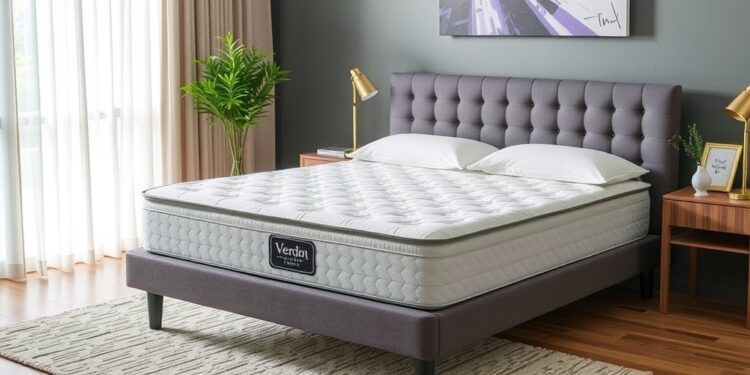Sleep is an essential component of human health, often viewed as the foundation for optimal physical and mental well-being. Yet, paradoxically, despite the extensive hours adults dedicate to slumber—approximately one-third of their lives—research focusing specifically on mattresses, a fundamental element of sleep hygiene, has remained remarkably scarce. This gap in the scientific literature motivated researchers from Mass General Brigham to undertake an innovative study that led to the development of the Boston Mattress Satisfaction Questionnaire (BMSQ). This newly devised tool aims to rigorously evaluate mattress satisfaction and discern its characteristics, marking a significant stride in sleep research.
The lead author of the study, Dr. Rebecca Robbins, who is affiliated with the Division of Sleep and Circadian Disorders at Brigham and Women’s Hospital, emphasized the crucial role that mattresses play in ensuring restful sleep. “A mattress provides the foundation for a good night’s sleep, and sleeping on a comfortable surface is one of our key behavioral recommendations for improving sleep quality,” Robbins noted. This clearly articulates the need for substantial inquiry into mattress research, a field that has been vastly overlooked.
The collaborative design of the BMSQ involved insights from sleep scientists, clinicians, and professionals within the mattress industry. The questionnaire assessed satisfaction across multiple parameters, including comfort, firmness, temperature, and an overall satisfaction rating on a 1-10 scale. This multifaceted approach allowed researchers to probe various characteristics related to mattresses, including type, size, the age of the mattress, and experiences of pain associated with waking.
The results elucidated various aspects of mattress usage and satisfaction. On average, participants reported a satisfaction score of 6.9 out of 10 with their current mattresses, indicating that while many people are generally pleased, there is ample room for improvement. Interestingly, researchers found that the most prevalent type of mattress among respondents was an all-spring mattress, accounting for 34.9% of the sample. Following closely were all-foam mattresses with 29.9% and hybrid mattresses, which combine springs with other materials, at 28.4%. A mere 5.0% of participants utilized air-filled chamber mattresses, underscoring the diverse preferences concerning sleep surfaces.
The study also highlighted ownership patterns regarding mattresses. The findings indicated that the majority of participants—39.8%—reported owning their mattress for 0-3 years, while a surprising 17.0% admitted to using a mattress that was 10 or more years old. This reveals a potential disconnect between mattress longevity and consumer satisfaction, pointing toward the critical need for education about the potential impacts of aging mattresses on sleep quality.
Further examination of mattress type revealed intriguing associations with overall satisfaction. Those sleeping on all-foam, hybrid, or air-filled chamber mattresses tended to report higher satisfaction levels compared to their all-spring counterparts. Additionally, researchers noted a positive correlation between the presence of a bed partner and elevated mattress satisfaction, suggesting that shared sleep environments may enhance the perceived quality of sleep and mattress utility.
Dr. Robbins and her team have taken notable steps towards addressing this significant gap in scientific research. The authorship of the study spans several esteemed professionals at Mass General Brigham, including Matthew D. Weaver, Laura K. Barger, Stuart F. Quan, and Charles A. Czeisler. This diversified team reflects the multidisciplinary collaboration necessary to explore the intricate relationship between sleep quality and mattress characteristics.
In terms of conflicts of interest, Drs. Quan and Czeisler have provided consulting services for the Bryte Foundation, while Dr. Robbins has reported personal fees from Savoir Beds Ltd. These acknowledgments underscore the importance of transparency in research, particularly in studies that intersect with industry interests.
The funding for this pivotal study was generously provided by a gift from the Bryte Foundation, allowing researchers the resources to examine a topic that holds profound implications for public health. The impact of this research goes beyond academic discourse, potentially influencing consumers’ choices and behaviors towards mattresses and overall sleep hygiene.
The BMSQ represents more than just a tool; it offers a structured framework for understanding mattress satisfaction—a neglected area previously lacking robust research. As findings continue to emerge from studies like this, they hold the potential to reshape how individuals perceive and prioritize sleep health interventions. With the increasing recognition of sleep’s significance to health, the BMSQ could serve as a critical resource as consumers navigate their options in the marketplace.
Ultimately, this research emphasizes the wide-ranging implications of mattress selection on sleep quality and health outcomes. As scientists and consumers alike begin to prioritize mattress research, tools like the BMSQ will play an indispensable role in bridging knowledge gaps, shaping industry practices, and enhancing the well-being of countless individuals in pursuit of better sleep.
Subject of Research: Mattress satisfaction and characteristics
Article Title: Developing a tool to assess mattress satisfaction: The Boston Mattress Satisfaction Questionnaire (BMSQ)
News Publication Date: 12-Mar-2025
Web References: http://www.massgeneralbrigham.org
References: Robbins, R, et al. “Developing a tool to assess mattress satisfaction: The Boston Mattress Satisfaction Questionnaire (BMSQ)” Frontiers in Sleep, DOI: 10.3389/frsle.2025.1509420
Image Credits: N/A
Keywords: Sleep, Mattress satisfaction, Sleep disorders, Health, Research
Tags: Boston Mattress Satisfaction Questionnaireconsumer mattress evaluationdiverse adult sleep patternsDr. Rebecca Robbins studyFrontiers in Sleep publicationMass General Brigham studymattress industry insightsmattress satisfaction researchsleep health and well-beingsleep hygiene importancesleep research advancementssurvey on mattress comfort





